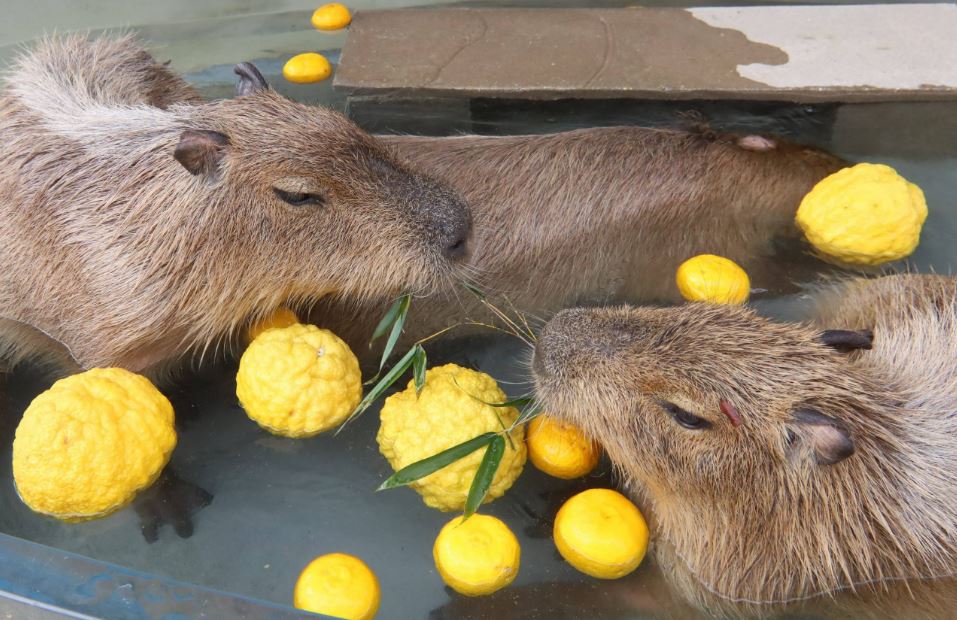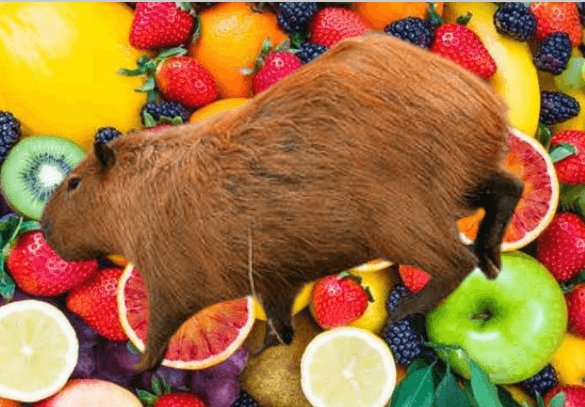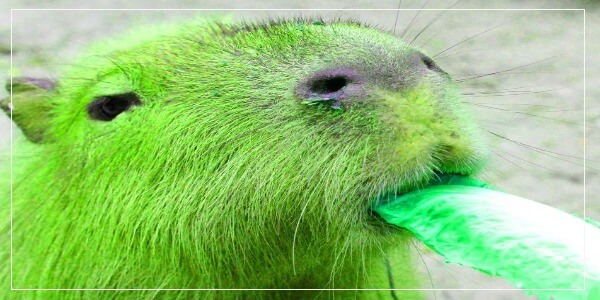Capybaras are the largest rodents in the world. This animal is highly sociable and herbivorous. They possess a diverse appetite for plants, grasses, and fruits. Regarding food preference, people are often unsure whether this rodent prefers tangy, citrus fruits like lemons.
If you want to know whether lemon is a healthy fruit for this animal, you have come to the right place. We will explore how capybaras react to lemons, whether they like lemons and the nutritional benefits the fruit offers them.
Although capybaras can consume lemons, they do not like them. The reason is that these rodents feed on various plants, grasses, and fruits in their natural habitat. Their diet consists of vegetation near water bodies, including aquatic plants and grasses.
While capybaras have a broad herbivorous diet, lemons are not typically part of their natural food. Lemons are known for their sour and acidic taste, which might not appeal to capybaras. In the wild, they rely on the abundance of vegetation available in their surroundings, which provides them with the necessary nutrients and hydration.
Although capybaras can safely consume many types of fruit, including lemons, they must exercise caution when introducing unfamiliar foods. Lemons, in particular, contain high levels of citric acid.
This can cause digestive upset or irritation in capybaras if consumed in large quantities. Their digestive system may be unable to handle lemon acidity, leading to discomfort or other adverse effects.
ALSO READ: What Are Capybara’s Favorite Food?
Do Capybaras Enjoy the Taste of Lemons?
No, capybaras do not enjoy lemons. While they are primarily herbivores inclined to consume various plants and grasses, their responses to specific flavors, such as lemons, often differ.
Several reports show that capybaras are curious about lemons, often sniffing or nibbling when provided as enrichment or as a novel food item. However, you must note that this does not necessarily mean they enjoy the taste. These rodents are known for their curious and exploratory behavior. Their interaction with lemons may be more driven by curiosity than a preference for the sour flavor.
Capybaras have taste buds adapted to detect and appreciate different flavors. Their taste preferences often center around the vegetation and fruits in their natural habitat. With their sour and acidic taste, Lemons do not align with their natural food preferences.

Are Lemons Harmful to Capybaras?
If consumed in small quantities, lemons will have a minimal to no adverse impact on the capybara digestive system. However, this fruit contains several components that can potentially harm capybaras if consumed in large quantities or as a significant part of their diet. Here are some digestive issues they might have.
- Gastrointestinal Irritation: Lemons’ high acidity can irritate the capybara’s delicate gastrointestinal tract. This irritation can lead to discomfort, inflammation, and potential damage to the digestive system.
- Stomach Discomfort: Citric acid can disrupt the natural pH balance in the capybara’s stomach, potentially causing discomfort, bloating, and even stomach pain. This can result in digestive disturbances, such as indigestion, gas, or stomach upset.
- Diarrhea: Lemons, especially in large quantities, can lax capybaras. The high acidity and citric acid content can increase bowel movements frequency and looseness, leading to diarrhea. Diarrhea can cause dehydration, electrolyte imbalances, and nutrient malabsorption if not promptly addressed.
- Tooth Enamel Erosion: Lemons’ acidic nature can contribute to tooth enamel erosion in capybaras. Prolonged exposure to acidic foods can weaken and wear away the protective enamel covering the teeth. This erosion can lead to dental problems, including tooth sensitivity, cavities, and dental pain.
If you consider introducing lemons or other citrus fruits to a pet capybara’s diet, consult a veterinarian or an experienced capybara caregiver. They can provide personalized guidance based on the individual capybara’s health, nutritional needs, and preferences.
RECOMMENDED
How Do Capybaras React to Lemons?
Capybaras, like many animals, react differently when encountering lemons. While individual responses vary, capybaras exhibit some common reactions when encountering this fruit.
- Curiosity: Capybaras are naturally curious animals and investigate new objects in their environment. When encountering a lemon, they often approach it, sniff it, or show interest in its presence. Their innate curiosity often drives this behavior to explore and interact with novel items.
- Exploration: Capybaras explore objects using their sensitive snouts and mouths. They may nibble or gently gnaw at the lemon, examining its texture and taste. Capybaras use exploratory behavior to gather information about their surroundings and assess the suitability of different objects as potential food sources.
- Taste and Smell Sensitivity: Capybaras have keen senses of smell and taste. Lemons have a distinct scent and a sour taste due to their citric acid content. Capybaras may display different reactions based on their sensitivity to these sensory cues. Some capybaras may show more interest and curiosity toward lemon scent or taste, while others display indifference or avoidance.
You must note that capybaras’ reactions to lemons should be cautiously observed, as their curiosity or exploration does not necessarily indicate a preference for lemons as a food source.
Furthermore, while capybaras may display curiosity or interact with lemons, it is essential to prioritize their well-being and ensure their safety by limiting the number of lemons you expose them to.
What are the Nutritional Benefits of Lemons to Capybaras?

There are different nutritional benefits capybaras enjoy when eating lemons in small quantities. Here are some of the benefits below.
- Vitamin C: Lemons have a high vitamin C content. Vitamin C is a vital antioxidant that supports the immune system, aids collagen production, and promotes overall health. While capybaras can synthesize their vitamin C and do not rely on dietary sources as humans do, a small amount of vitamin C from lemons may provide additional antioxidant benefits.
- Electrolyte Balance: Lemons contain potassium and magnesium, which maintain proper hydration, nerve function, and muscle contractions. Although capybaras typically obtain these electrolytes from their herbivorous diet, lemons could contribute to electrolyte balance.
- Flavonoids and Phytonutrients: Lemons contain flavonoids and other phytonutrients, which are plant compounds with potential health benefits. These compounds possess antioxidant and anti-inflammatory properties that support overall health and protect against certain diseases.
- Digestive Health: Lemons are acidic and may stimulate digestive enzyme production, aiding in nutrient breakdown and absorption. Additionally, lemons’ high fiber content promotes healthy digestion and prevents constipation.
Guide on How To Incorporate Lemons Into Your Capybaras Diet
Incorporating lemons into your capybara’s diet is key to preventing digestive issues. Here are some tips or guides below.
- Consult with a veterinarian: Before introducing any supplementary food into your capybara’s diet, it is essential to consult with a veterinarian or an experienced exotic animal specialist. They can assess your capybara’s specific dietary needs and guide whether incorporating lemons is appropriate for your capybara.
- Start with Small Amounts: If your veterinarian approves lemons in your capybara’s diet, offer small amounts. Start with a slice of lemon or drops of lemon juice. This allows you to observe your capybara’s reaction and monitor for adverse effects.
- Monitor for Digestive Issues: Consider how your capybara reacts to lemons. Some capybaras may not tolerate citrus fruits well, and it could lead to digestive issues such as diarrhea or an upset stomach. If you notice any negative digestive reactions, discontinue feeding lemons immediately.
- Use Organic Lemons: When selecting lemons for your capybara, opt for organic lemons. This reduces the risk of pesticide or chemical residues on the fruit’s skin. Wash lemons before feeding them to your capybara.
Conclusion
Although capybaras are herbivorous, consuming various fruits, plants, and grasses, you must exercise caution when introducing lemons to their food. This is because this fruit isn’t part of their food repertoire. Capybaras also dislike this fruit.
We have discussed all the necessary steps to introduce lemons to your capybara. Ensure you do not overfeed them to prevent digestive problems.









